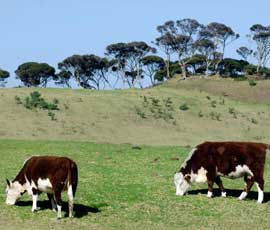New Zealand dairy industry dwarfs our own

The New Zealand dairy industry is now about one-third larger than the UK in the volume of milk it produces, with 95% of milk exported, according to John Luxton, chair of Dairy New Zealand.
Highlighting the market differences, Mr Luxton explained how New Zealand dairy farmers had worked hard to develop overseas trade agreements, spent extensively on research and education and had “largely got politicians out of the dairy industry and were better for it”.
Speaking at the Oxford Farming Conference on Thursday (3 January), Mr Luxton told delegates there were 11,800 dairy farms in New Zealand, with a herd average of 393 cows and a total of 19.1bn litres of milk produced last season.
With the majority of the country’s milk going overseas, there has been a focus on processing products that have a longer shelf life and on developing value-added lines.
Mr Luxton said that by operating without subsidies his country’s farmers had been driven to continuously improve their businesses and innovate in order to cope with volatile global prices.
“I feel sympathy for EU farmers, who have been constrained from growth for 25 years by quota systems. You don’t get to see change within your farm systems on an annual basis,” he said.
The rising wealth of a middle class in Asia and the Middle East has allowed new markets to grow and New Zealand now has a free trade agreement with China, it’s largest dairy market.
Faster milking systems such as the herringbone and rotary dairy have evolved out of a drive for lower cost of production. The farming system is still largely focused around the seasonal pasture growth pattern, with most dairy herds calving in spring and drying off in winter.
This has led to relatively high levels of fertility in the NZ dairy cow (average of four-and-a-half lactations) and an increasing focus on crossbred Kiwicross (Friesian x Jersey) herds.
Dairying is becoming more corporate in New Zealand, but the majority of farms are still owner-operated and younger, professional managers are coming in. Contract milking, leasing, share-milking and equity positions have become positive career routes for young farmers.
Read more from Oxford Farming Conference
See our milk price cuts crisis page
